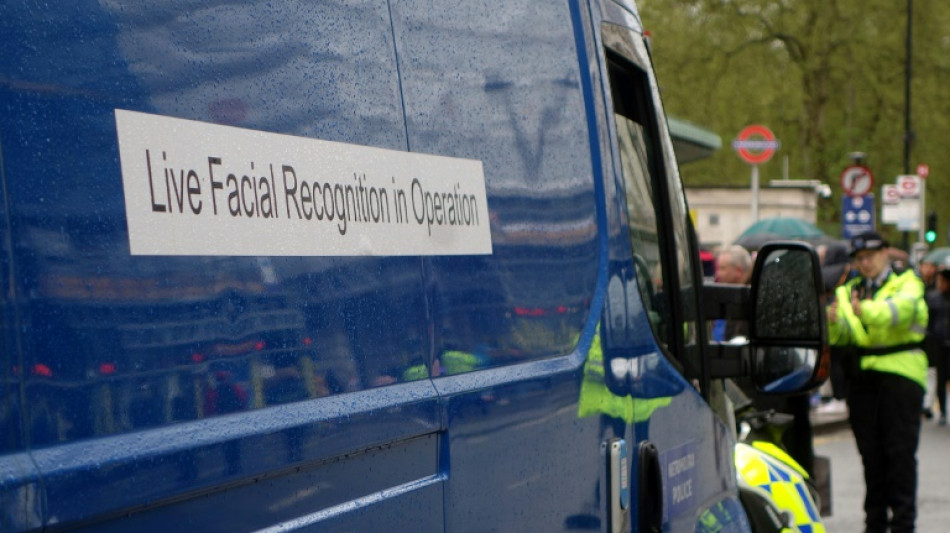
-
 Loaf behind bars: Aussie inmate says Vegemite a human right
Loaf behind bars: Aussie inmate says Vegemite a human right
-
In film's second act, 'Wicked' goes beyond Broadway musical

-
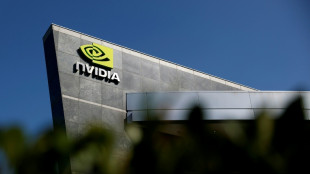 Asian markets track Wall St down with Nvidia, US jobs in view
Asian markets track Wall St down with Nvidia, US jobs in view
-
Scott Boland: the best 'spare' fast bowler around

-
 Fire and Ashes: England bank on fast bowling barrage in Australia
Fire and Ashes: England bank on fast bowling barrage in Australia
-
North Korea says Seoul-US sub deal will trigger 'nuclear domino' effect
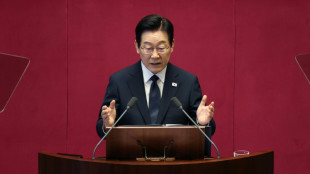
-
 Education for girls hit hard by India's drying wells
Education for girls hit hard by India's drying wells
-
Haitian gangs getting rich off murky market for baby eels

-
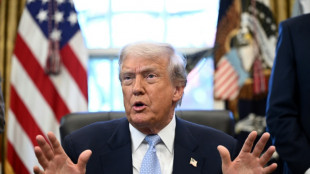 Trump says will talk to Venezuela's Maduro, 'OK' with US strikes on Mexico
Trump says will talk to Venezuela's Maduro, 'OK' with US strikes on Mexico
-
Oscar Piastri wins Australia's top sports honour
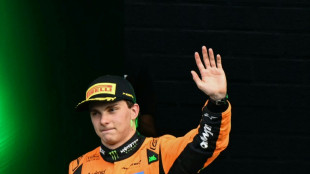
-
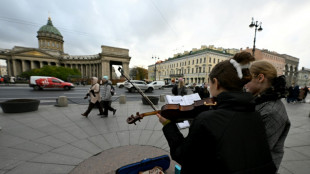 'Severely restricted': Russia's Saint Petersburg faces cultural crackdown
'Severely restricted': Russia's Saint Petersburg faces cultural crackdown
-
Polish PM denounces 'sabotage' of railway supply line to Ukraine
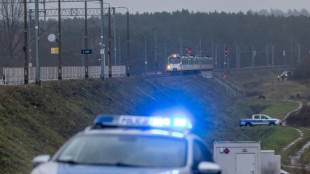
-
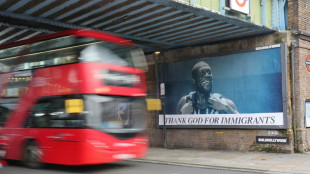 UK toughens asylum system with radical overhaul
UK toughens asylum system with radical overhaul
-
Carney's Liberals pass budget, avoiding snap Canada election
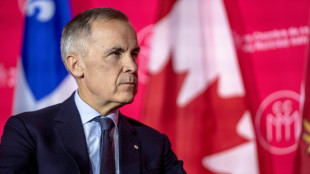
-
 LeBron back in training, edges closer to Lakers return
LeBron back in training, edges closer to Lakers return
-
Climate talks run into night as COP30 hosts seek breakthrough

-
 Germany and Netherlands lock up World Cup spots in style
Germany and Netherlands lock up World Cup spots in style
-
Germany's Woltemade hopes for 2026 World Cup spot after scoring again

-
 Germany 'send message' with Slovakia rout to reach 2026 World Cup
Germany 'send message' with Slovakia rout to reach 2026 World Cup
-
Trump unveils fast-track visas for World Cup ticket holders

-
 Netherlands qualify for World Cup, Poland in play-offs
Netherlands qualify for World Cup, Poland in play-offs
-
Germany crush Slovakia to qualify for 2026 World Cup

-
 Stocks gloomy on earnings and tech jitters, US rate worries
Stocks gloomy on earnings and tech jitters, US rate worries
-
'In it to win it': Australia doubles down on climate hosting bid

-
 Former NFL star Brown could face 30 yrs jail for shooting case: prosecutor
Former NFL star Brown could face 30 yrs jail for shooting case: prosecutor
-
Fate of Canada government hinges on tight budget vote

-
 New research measures how much plastic is lethal for marine life
New research measures how much plastic is lethal for marine life
-
Mbappe, PSG face off in multi-million lawsuit

-
 EU defends carbon tax as ministers take over COP30 negotiations
EU defends carbon tax as ministers take over COP30 negotiations
-
McCartney to release silent AI protest song

-
 Stocks tepid on uncertainty over earnings, tech rally, US rates
Stocks tepid on uncertainty over earnings, tech rally, US rates
-
Louvre shuts gallery over ceiling safety fears

-
 'Stranded, stressed' giraffes in Kenya relocated as habitats encroached
'Stranded, stressed' giraffes in Kenya relocated as habitats encroached
-
US Supreme Court to hear migrant asylum claim case

-
 Western aid cuts could cause 22.6 million deaths, researchers say
Western aid cuts could cause 22.6 million deaths, researchers say
-
Clarke hails Scotland 'legends' ahead of crunch World Cup qualifier

-
 S.Africa says 'suspicious' flights from Israel show 'agenda to cleanse Palestinians'
S.Africa says 'suspicious' flights from Israel show 'agenda to cleanse Palestinians'
-
South Korea pledges to phase out coal plants at COP30

-
 Ex-PSG footballer Hamraoui claims 3.5m euros damages against club
Ex-PSG footballer Hamraoui claims 3.5m euros damages against club
-
Mbappe, PSG in counterclaims worth hundreds of millions

-
 Two newly discovered Bach organ works unveiled in Germany
Two newly discovered Bach organ works unveiled in Germany
-
Stocks lower on uncertainty over earnings, tech rally, US rates

-
 Barca to make long-awaited Camp Nou return on November 22
Barca to make long-awaited Camp Nou return on November 22
-
COP30 talks enter homestretch with UN warning against 'stonewalling'

-
 France makes 'historic' accord to sell Ukraine 100 warplanes
France makes 'historic' accord to sell Ukraine 100 warplanes
-
Delhi car bombing accused appears in Indian court, another suspect held

-
 Emirates orders 65 more Boeing 777X planes despite delays
Emirates orders 65 more Boeing 777X planes despite delays
-
Ex-champion Joshua to fight YouTube star Jake Paul

-
 Bangladesh court sentences ex-PM to be hanged for crimes against humanity
Bangladesh court sentences ex-PM to be hanged for crimes against humanity
-
Trade tensions force EU to cut 2026 eurozone growth forecast


Face-off in Britain over controversial surveillance tech
On a grey, cloudy morning in December, London police deployed a state-of-the-art AI powered camera near the railway station in the suburb of Croydon and quietly scanned the faces of the unsuspecting passersby.
The use of live facial recognition (LFR) technology -- which creates biometric facial signatures before instantaneously running them through a watchlist of suspects -- led to 10 arrests for crimes including threats to kill, bank fraud, theft and possession of a crossbow.
The technology, which was used at the British Grand Prix in July and at King Charles III's coronation in May, has proved so effective in trials that the UK government wants it used more.
"Developing facial recognition as a crime fighting tool is a high priority," policing minister Chris Philp told police chiefs in October, adding that the technology has "great potential".
"Recent deployments have led to arrests that would otherwise have been impossible and there have been no false alerts," he added.
But the call to expedite its roll-out has outraged some parliamentarians, who want the government's privacy regulator to take "assertive, regulatory action" to prevent its abuse.
"Facial recognition surveillance involves the processing, en masse, of the sensitive biometric data of huge numbers of people -- often without their knowledge," they wrote in a letter.
"It poses a serious risk to the rights of the British public and threatens to transform our public spaces into ones in which people feel under the constant control of corporations and the government."
- False matches -
Lawmakers allege that false matches by the technology, which is yet to be debated in parliament, have led to more than 65 wrongful interventions by the police.
One was the arrest of a 14-year-old boy in school uniform, who was surrounded by officers and had his fingerprints taken before his eventual release.
MPs said the use of the technology by private companies, meanwhile, represented a "radical transfer of power" from ordinary people to companies in private spaces, with potentially serious consequences for anyone misidentified.
Members of the public, they said, could be prevented from making essential purchases like food, be subject to intrusive interventions or be brought into dangerous confrontations with security staff.
Last year the owner the Sports Direct chain, Frasers Group, defended the use of live LFR technology in stores, saying the technology had "significantly" cut shoplifting and reduced violence against staff.
- 'Walking ID cards' -
Civil liberties groups say the technology is oppressive and has no place in a democracy.
Mark Johnson, an advocacy manager for Big Brother Watch, compares the technology to the writer George Orwell's novel "Nineteen Eighty-Four" -- a portrait of a totalitarian state in which the characters are under constant surveillance.
The technology, he told AFP, "is an Orwellian mass surveillance tool that turns us all into walking ID cards".
Activists argue the technology places too much unmonitored power in the hands of the police, who have been given increased powers of arrest over protests through the Public Order Act.
The new laws, pushed through parliament by the right-wing Tory government four days before the coronation, give police the power to stop a protest if they believe it could cause "more than minor disruption to the life of the community".
Critics are especially concerned about the lack of oversight in the composition of police watchlists, saying some have been populated with protestors and people with mental health issues, who are not suspected of any offences.
"Off-the-shelf versions of these tools need legal and technical oversight to be used responsibly and ethically," one activist told AFP.
"I worry police forces don't have that resource and capacity to do this right now."
The police say that the details of anyone who is not a match on a watchlist are immediately and automatically deleted.
The Home Office interior ministry insists data protection, equality and human rights laws strictly govern the use of the technology.
But that has not satisfied opponents, in a country where previous attempts to introduce compulsory identity cards have met fierce resistance.
In June 2023, the European Parliament voted to ban live facial recognition in public spaces.
In the UK, lawmakers who oppose the technology, want to go further.
"Live facial recognition has never been given explicit approval by parliament," said Conservative MP David Davis, who once resigned his seat alleging the extension of custody time limits for terror suspects without charge was a breach of civil liberties.
"It is a suspicionless mass surveillance tool that has no place in Britain."
F.AbuZaid--SF-PST




